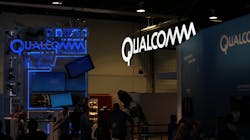Apple announced that it had settled its wide-ranging and long-running legal battle with Qualcomm over patent licensing payments. As part of a broader settlement, Apple said that it had agreed to long-term licensing and chipset supply deals with its former main modem supplier, reestablishing its relationship with Qualcomm just as the smartphone industry shifts from 4G to 5G.
The announcement came as Apple and Qualcomm opened a federal court case over the patent dispute in San Diego, California. In addition to stamping out all ongoing legal conflicts, Apple announced a “multiyear chipset supply agreement” with Qualcomm, opening the door for the world's most profitable phone maker to use Qualcomm's modem chips in the iPhone. Apple also agreed to license Qualcomm's IP for six years.
As its legal skirmishes with Qualcomm escalated in recent years, Apple started to jettison Qualcomm's 4G modems in the iPhones in favor of Intel's, which are used inside all the latest iPhone models. Intel started supplying chips for Apple's 2017 iPhone, sharing orders with Qualcomm. The legal conflict centered on Apple accusing Qualcomm of using illegal patent practices to extract exorbitant royalties and maintain a monopoly on modem chips.
As the conflict continued, Apple and its contract manufacturers stopped paying royalties on Qualcomm's standard essential patents, which are vital to 3G and 4G communications. Qualcomm alleged that Apple was using its IP without paying for it. In November, Qualcomm said Apple was $7 billion behind on its licensing payments—an amount Apple contested. Tuesday's settlement also includes an undisclosed payment from Apple to Qualcomm.
But amid all the legal disagreements, the settlement suggests that Apple and Qualcomm needed each other. Qualcomm has long led the development of advanced modem chips, a vital component of 5G technology, which is projected to be more than 10 times faster than 4G networks while lowering latency. Qualcomm's 5G modems are considered the industry's most advanced, while Intel seemed to be struggling with its 5G modem engineering.
The truce is the worst-case-scenario for Intel. Not long after Apple announced the end of its legal skirmishes with Qualcomm, Intel said that it would get out of the smartphone modem chip business. Intel, the largest producer of chips used in personal computers and data centers, no longer intends to sell 5G modems for the smartphone space citing a lack of potential profits. Intel's 5G modem was set to start shipping to customers before the end of 2019.
About the Author
James Morra
Senior Editor
James Morra is the senior editor for Electronic Design, covering the semiconductor industry and new technology trends, with a focus on power electronics and power management. He also reports on the business behind electrical engineering, including the electronics supply chain. He joined Electronic Design in 2015 and is based in Chicago, Illinois.

